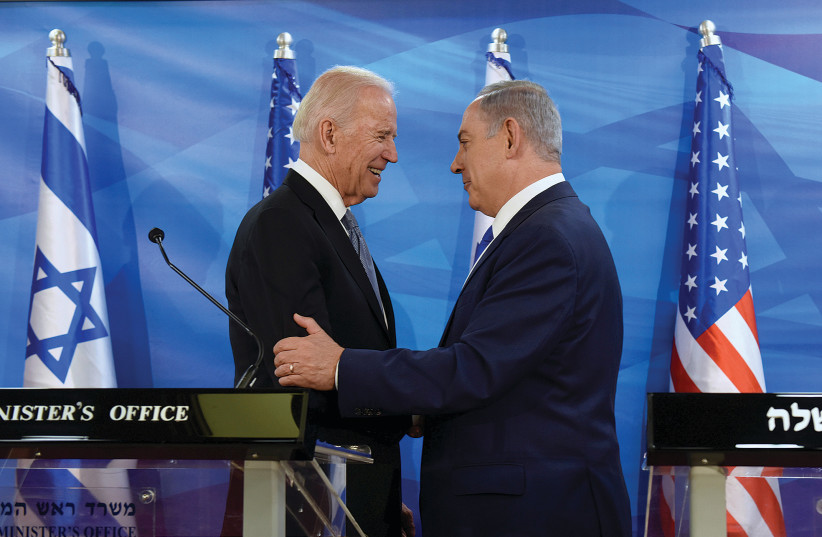“Netanyahu to address major Jewish Republican conference,” read the headline to a story Saturday in the online edition of The Washington Post, with the underline reading: “The speech Saturday is a rare show of partisanship by a foreign ally.”
Haaretz’s headline read: “In stark display of partisanship, incoming PM Netanyahu addresses Republican Jewish confab.”
Buckle up and get ready for a reprise of a refrain heard constantly during Benjamin Netanyahu’s previous years in office: he is aligning Israel with the Republican Party and turning support for Israel into a partisan issue.
At a Jewish Republican Coalition (RJC) convention on Saturday in Las Vegas, Netanyahu – interviewed from Jerusalem – spoke of his 40-year-old friendship with Joe Biden, praised Barack Obama for signing a 10-year, $38 billion defense package with Israel, and said he had disagreements in the past with both Republican and Democratic presidents, an allusion to memoirs that have come out about the Netanyahu-Trump years that revealed tension, despite the public perception of a relationship made in heaven.
Was it the wisest move in the world for Netanyahu to have his first address to an American audience since his November 1 election victory be to a partisan group?

Probably not, because it only reinforces the perception that he meddles in partisan American politics. Truth be told, however, if the Jewish Democratic Council of America – the RJC’s Democratic counterpart – would ask him to appear via satellite at a parley of its own, he would most likely be more than willing.
Netanyahu’s election victory, and what is likely to be the most right-wing and religious government in Israel’s history at a time when there is a Democratic president in the White House and the Democrats are in control of the Senate, is not going to make for smooth sailing in US-Israel ties.
The US has already signaled that it will not deal with Itamar Ben-Gvir as a minister, might not deal with Bezalel Smotrich as well, and have let their displeasure about the likely makeup of the next government be known by launching an FBI investigation into the death of Palestinian-American journalist Shireen Abu Akleh. It is highly unlikely that the timing of that investigation is coincidental.
Governments have all kinds of ways of signaling their displeasure to one another: This is one of those ways. Washington was making a statement: US-Israel ties, which ran relatively smoothly when there was a government in power in Jerusalem that the administration favored, were entering a different, more difficult phase.
So now brace yourselves for story after story about how US-Israeli relations are deteriorating and entering a crisis mode. Each event, such as the FBI investigation and Netanyahu’s speech to a group of Republican Jews, will be seen as proof of this thesis.
But caution is needed. Will Netanyahu’s return to power as the head of a government that includes Ben-Gvir and Smotrich improve US-Israel relations? No.
Will it help Israel among progressive Democrats? Obviously not.

But will it destroy relations with Washington and the Democratic Party? Again, no.
When Netanyahu lost the last election in March 2021, a diverse, rainbow coalition was established that included the Left and the Right, religious and secular, pro-settlement politicians and others who made their political careers opposing the settlements, Jews and even an Islamic party, one might have expected that those on the progressive wing of the Democratic Party who insisted that they could no longer support “Netanyahu’s Israel,” would embrace the Israel represented by Naftali Bennett and Yair Lapid’s diverse government.
But that embrace from certain progressive segments of the party – from the “Squad” and fellow travelers – did not materialize.
Why not? Because for them, the problem is not the government of Israel, but Israel itself. As a result, even with the diverse government there were members of Congress who didn’t want to provide supplemental funding for the Iron Dome, who wanted to condition military aid to Israel, and who accused it of apartheid.
A return of Netanyahu to lead a government that includes Ben-Gvir and Smotrich will make the job of those critics easier.
But don’t be misled. Their Israel-bashing is not because of Netanyahu, Ben-Gvir and Smotrich, it’s just that those three will now provide a more convenient and “acceptable” excuse.
As incidents such as Netanyahu’s speech to the RJC and the FBI investigation into Abu Akleh’s death hit the front pages of the newspapers, so – too – will there be a return to hyperventilated concern that the traumatic days of the Obama-Netanyahu era are upon us once again.
But here too, caution is needed in making those comparisons.
Biden and Netanyahu see eye-to-eye
First, Biden is not Obama, and his feelings for Israel are deeper and more heartfelt than Obama’s ever were. Further, he does have a personal chemistry with Netanyahu that Netanyahu never shared with Obama.
Secondly, two of the major sources of friction between Israel and the US that existed during the Netanyahu-Obama years are not immediately on the agenda: Iran and the Palestinian issue.
While Biden’s team seemed hell-bent in the late summer to re-enter the nuclear deal with Iran, efforts to that effect later stalled and the negotiations broke down. Nevertheless, there was an expectation that – with the administration keen on finalizing a deal – the negotiations would resume after the midterm elections.
But now the midterms are over, and much has transpired in the interim to render overwrought concern that Washington is on the verge of a new deal with Iran.
First, there are the protests that are roiling Iran, and the brutal force the Iranian government is using to try – so far unsuccessfully – to put them down. Secondly, the Iranian-Russian alliance has dramatically changed the equation.
At a time when the Iranians are not only killing their protesters, but are also giving the Russians the wherewithal to kill Ukrainians, it seems highly unlikely that Biden will now throw a bone or life-jacket at the Iranian regime. As such, there is no need for a frontal confrontation between Biden and Netanyahu over Iran, at least not for the foreseeable future.
Biden and the Palestinian problem
The same is true of the Palestinian issue.
Biden is the first president in recent memory who has not put brokering an Israeli-Palestinian deal at the top of his agenda.
There are a couple of reasons for this. One was the realization in Washington that this is not a popular idea with the Israeli public, and the Biden administration did not want to pressure the Bennett-Lapid government – a government they wanted to see remain in power – to do something that would cost it at the ballot box.
Secondly, the administration realized that the stars are not currently aligned to make any such push for a diplomatic agreement successful. Hamas is in charge of Gaza, Palestinian Authority President Mahmoud Abbas is on his last legs and no one knows what will emerge when he leaves the scene, and no Israeli government – especially not the incoming one – will be willing to take any risks right now on the Palestinian track, not knowing who will be in charge on the other side, or for how long.
Here, too, there is little likelihood of immediate friction between the US and Israel over negotiations with the Palestinians – as there was during the Obama administration when John Kerry dedicated enormous time, energy and prestige in trying to broker a deal – because no one believes that given the lay of the land right now, there is any real chance of an agreement.
While there is unlikely to be friction over the marquee issues, there will be constant friction over settlement building – as there has been for the last 50 years – and instances where Israel uses force that Washington will deem “disproportionate.”
And each time this friction will come to the fore, there will be dire warnings in some quarters about a crisis in ties and the inevitability of a breakdown in the US-Israel relationship.
But all this should be taken with a grain of salt. Not every dispute, nor even every public slap on the wrist, presages a crisis.
US-Israel ties are wide enough, deep enough and strong enough to withstand the inevitable bumps in the road – even big bumps – that will ensue during those years when there is a government in Jerusalem with one worldview, and an administration in Washington with a starkly contrasting one.
Israel and the US have been there and done that in the past, and the relationship survived intact. This time should not be that different.
